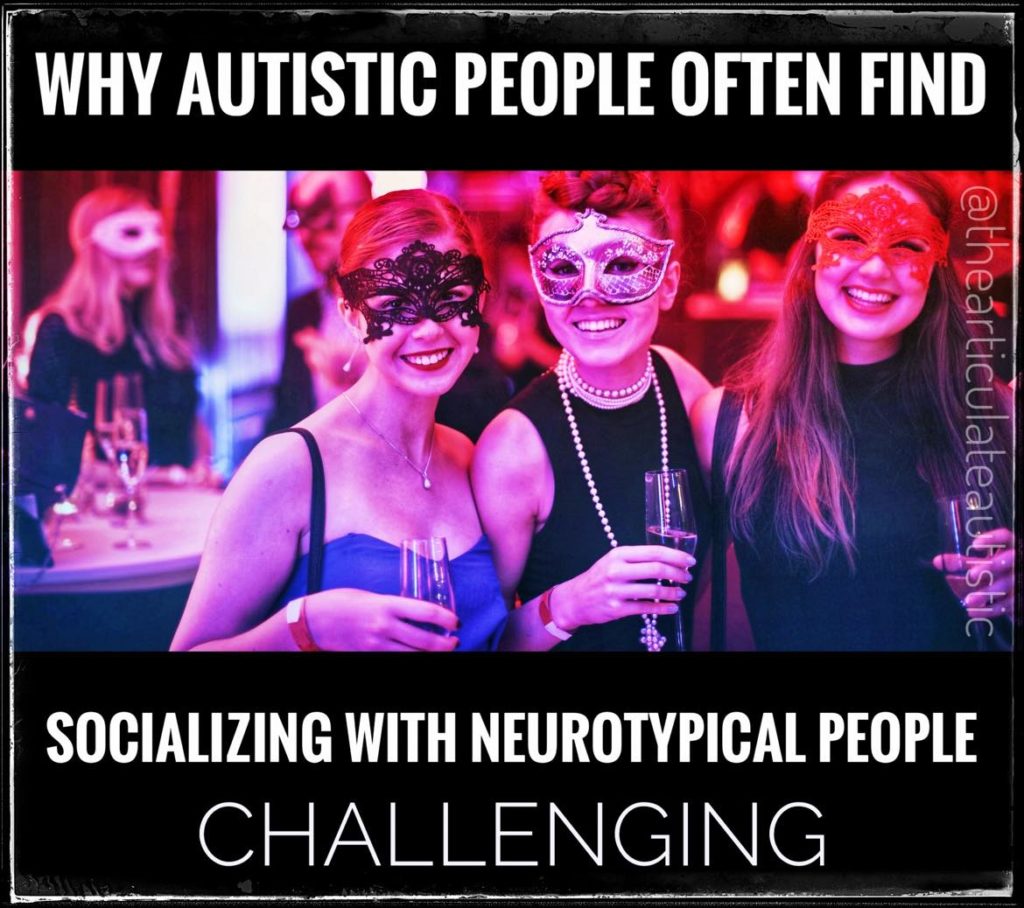Why Autistic People Often Find Socializing With Neurotypical People Challenging

A few weeks ago, I asked the autistic community on Instagram what specific reasons they may find socializing (especially with neurotypical people) a challenge. If you have an autistic person in your life, you may mistakenly believe that they are “rude”, “standoffish”, or “selfish” because they frequently decline your invites to hang out and spend time together.
There is usually no malicious intent on the part of the autistic person when they decide to sit out a social event. Because autistic and neurotypical brains process information differently, what a neurotypical person may experience as pleasant and relaxing (for example, a social event), an autistic person may find stressful and exhausting.
Here are some common reasons autistic people find socializing with neurotypical people challenging:
Getting Lost on the Way to the Event

I think this is one challenge that many people don’t think of. Not every autistic person struggles with getting lost. Some have an amazing sense of direction. I, for one, am NOT one of those people. I can get lost anywhere, even places I’ve been to multiple times. Before GPS, I could hardly leave my house because I couldn’t find my way to or from places. I can’t tell you how many times I’ve had to pull over and sob because I didn’t know where I was.
Whenever I drove someplace new, I would always factor in “getting lost time” because it was inevitable that it would happen, even if I’d printed out a map and turn-by-turn driving directions. By the time I’d actually made it to the event in question, I’d already used up any energy I would have had for the event in the car driving around in panicked circles.
Small Talk
I understand that small talk has a purpose for neurotypical people. From what I’ve gathered, it’s just a way to be together and spend some casual time connecting without too much fuss or worry about the actual conversation topic. However, even understanding this, I do find it a challenge because there are a lot of non-verbal cues that go into small talk that my brain just can’t read. Also, talking about the weather and current events can make me feel disconnected because I’m truly not interested in that type of conversation. My brain plans an escape route even if I’m honestly trying to stay present and participate in the conversation.
Auditory Processing Differences
Not only am I autistic and ADHD, I also have differences in the way I process auditory information. My ability to listen and make sense of auditory information is poor, and it’s even more of a challenge for me when multiple people are talking. Furthermore, I can’t tell where sound is coming from unless I’m looking directly at its source, and I can completely miss people talking to me unless they say my name (even if they are right next to me).
Pressure to “Mask” Autistic Traits
This is a big one. Neurotypical people often seem distracted and unnerved by my autistic traits to the point where I feel pressured to mask them. If I mask at a social event, my social battery will drain twice as fast as when I don’t mask.
For me, masking feels like balancing fine porcelain on my outstretched hands while I walk a tightrope with no net below me. Every movement is painstaking, precise, and calculated, and it takes immense concentration.
Jaime A. Heidel – The Articulate Autistic
During masking, I manually monitor every inch of my face, from my eyebrows to my chin. I have to tell the muscles in my face when and how to move each and every second as corresponding facial expressions do not show up automatically when I feel an emotion. I have to also manually monitor the tone, cadence, and loudness of my voice each and every second, and I have to force myself not to stim or to stim in a way that is not noticeable.
Imagine having to manually control your own heartbeat, blinking, and breathing while also trying to interact with others while simultaneously trying to look comfortable and at ease. Sound impossible? This is what masking is like for many autistic people!
Unspoken Neurotypical Social Rules

There are many unspoken neurotypical social rules that autistic people are not aware of unless we are explicitly taught, given the reason why, and given multiple examples from a very patient instructor who is teaching them to us like another language. Because of this innocent unawareness of unspoken social rules, navigating a neurotypical social situation can be akin to walking through a room with invisible trip-wires, never knowing when you’re going to accidentally set one off, and having everyone look at you when you do set one off as if you did so out of malice.
Navigating a neurotypical social situation can be akin to walking through a room with invisible trip-wires, never knowing when you’re going to accidentally set one off, and having everyone look at you when you do set one off as if you did so out of malice.
Struggle to Read Neurotypical Non-Verbal Cues
Neurotypical people communicate with one another using a complex, ever-changing set of facial expressions, body language, and vocal tones that autistic brains often cannot pick up on. Because of this inability to read neurotypical non-verbal cues, the neurotypical person may believe the autistic person is purposefully ignoring their attempts to communicate and become offended when they don’t receive the social response they expected. This common misunderstanding can cause neurotypical people to quickly and drastically change the way treat the autistic person they’re interacting with, which only succeeds in causing confusion and trauma.
Misunderstandings of Autistic Non-Verbal Cues
Another common challenge when autistic and neurotypical people socialize is the misunderstandings that happen when neurotypical people are exposed to autistic non-verbal cues, which are quite different from those of our non-autistic counterparts.
For example, arms crossed for a neurotypical person may indicate defensiveness, whereas an autistic person may be crossing their arms for necessary proprioceptive input. Lack of eye contact is read as having something to hide by neurotypical people, but, for the autistic person, eye contact can be too intense, distressing, and distracting, so it is avoided.
Frequent sighing is often an indication of boredom or disgust amongst neurotypical people, but autistic people may use this way of breathing to achieve emotional balance and regulation. A slack facial expression may be seen as threatening to the neurotypical eye when, in fact, that’s how the autistic person’s face looks all the time regardless of their emotional state!
Hypervigilance
Many autistic people are traumatized by past abuse, bullying, and social misunderstandings. This can cause hypervigilance when out amongst others in an attempt to protect oneself from further harm. Since hypervigilance is often a sign of complex PTSD, it is an automatic function that cannot be easily “turned off”, and it can quickly sap the energy of an already-exhausted autistic person in the middle of a social event.
Misunderstanding Social Hierarchy
While I understand social hierarchy from an intellectual standpoint, it wasn’t something I was even aware existed until I was in my late 20s or early 30s. The concept of being expected to speak to and treat someone who “outranks” me socially in a different way than someone who is seen as my “peer” still baffles me. I’ve always viewed people as people. The CEO of a company and the janitor should, in my opinion, be treated with the same respect.
Lack of Interest in or Knowledge About “Typical” Topics

Autistic people are often specialists in certain areas of interest. For example, I love Star Trek: The Next Generation, The Sims, Dean Koontz books, creepy podcasts, and horror movies. However, I have no idea what sports team is playing, what the Kardashians are doing, or what weird challenge GenZ is coming up with on TikTok these days. If someone brings those topics up at a social event, I tend to just be quiet and listen (if my brain doesn’t automatically drift away).
Unsure When to Speak
Not knowing when it’s my turn to speak in a conversation has been the bane of my existence at social events. To compensate, I’ve learned to mostly just listen until specifically spoken to because when I used to try to put in my two cents, I’d inevitably interrupt someone who was apparently just pausing to breathe and wasn’t yet done with their point.
Taking Jokes/Innuendo/Sarcasm Literally
As an autistic person, I don’t quite fit the stereotype of “doesn’t get humor” because I do, and I’m actually quite a sarcastic person myself. I love plays on words, especially, but I’ve heard that is common in autistic humor. However, I’ve had plenty of face-reddening moments where I’ve taken something said to me as 100% literal and factual when they were just making a joke. Unfortunately, it’s not just embarrassing for me, it also seems to offend the neurotypical person that I didn’t understand their joke as though, again, there was some sort of malice behind my inability to make the distinction.
Feeling and Absorbing the Emotions of Others

When I still hear people saying that autistic people have no empathy, it makes me cringe. While some of us may struggle with putting ourselves into another person’s “shoes”, so to speak, many autistic people are actually hyper-empathetic. This means we often feel more deeply than some of our neurotypical counterparts, thereby emotionally absorbing the conflicting feelings of everyone in the room including all the unspoken tension over the outward “niceties” the neurotypical people have woven into society and are expected to perform, and it is SO TIRING!
The Takeaway
Your autistic loved one is not being rude by avoiding social situations. Many of us don’t find them fun and relaxing the way you do. They aren’t an automatic “bonding experience”. They are a challenge that we must take a significant amount of time to gear up for and a significant time to recover from. Considering everything I’ve just explained, is it any wonder we’d rather hang out alone and read or play video games or work on a project?
Consider this, the next time your autistic loved one says “yes” to a social event, look at exactly what we are facing to give you this time. I’m not asking for any special treatment or a reward for hanging out with you, but I am asking you to realize how many extra challenges I have to face that you don’t even think about just to do what you are asking. Be understanding, be accommodating, and let us leave social situations when we say we have to.
The more we trust that we can be our authentic selves around you, the more likely you are to have more frequent and positive social interactions with us in the future.




really interesting article Jaimie, and certainly there are some areas that I empathise with, especially the small talk, the issue of behaving differently to people based on a societal hiearchy ( I once forgot to bow to Royalty – I wasn’t being rude, I was just having a nice discussion with them; they didn’t seem to mind actually at all), taking innuendo seriously, and feeling emotion too much. I have a lot to be thankful for to the Vulcan. LLAP
thank you for posting this
Thank you for this. I’ll take Star Trek over the Kardashians any time. I was called unsociable all the time when I was younger.
Perhaps plays on words are common in autistic humor because we’re constantly forced to be alert to the difference between literal and figurative meanings. So why wouldn’t we enjoy a chance to poke a little fun at that potential for misunderstanding? (I personally take delight in turning the tables on neurotypicals, working subtle plays on words into our conversations just to see if they notice. Very often they don’t!)
Haha! I think you’re right. That makes perfect sense.
There is one you missed (or I overlooked it) autistic people bring up relatable stories as a way to agree/relate/connect. however, the other party sees it as making it about yourself.
This one I get a lot and people get mad like you always want to talk about you and im just trying to participate in the conversation and that is how I know how to. All of this information is great to know but what now? As a late diagnosis adult how do I manage these things or are there tips besides masking. Everyone has all this information about how and why we act this way and that is makes others upset when they think we are rude. What can I do with this info if I cant change myself or my behavior ?
I thoroughly enjoyed reading your insightful article on why autistic individuals often encounter challenges when socializing with neurotypical people. Your explanation of the contrasting communication styles and social expectations was incredibly illuminating and relatable. It’s empowering to see someone addressing this topic with such clarity and understanding. Your website is a valuable resource for both autistic and neurotypical individuals, fostering greater understanding and empathy. Thank you for sharing your expertise and experiences. Keep up the fantastic work!
Best regards,
Gary Ford